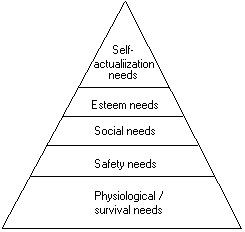

In Communication we are generally concerned with persuading people in one way or another, even if it's only persuading them that we're quite nice people. We therefore will often be concerned with examining people's needs, in order that we can respond to those needs in our communication. People's needs motivate them to act; if we can identify those needs, we have a chance of motivating them to do what we want them to do, even if only attend to our communication in the first place.
One humanist psychologist who is constantly referred to in the study of Communication is Abraham Maslow, who developed the 'hierarchy of needs' shown in the graphic. Like Carl Rogers, Maslow emphasised the human need for self-actualization, the realisation of one's full potential as a human being. According to Maslow, before one can set about self-actualization, a person has first to solve the problems associated with the four lower-level needs of the hierarchy:
| you must satisfy your physical wants before you can take the next step up the motivational hierarchy; | |
| once you have satisfied your basic biological needs, you can get on with exploring your environment. It is well known, however, that a child will not begin to explore unless it feels secure. But the drive for safety is in itself a motivator for exploration - when you know 'what's out there' in the world, your uncertainty is reduced, the world s more predictable and 'safe'; | |
| these are 'belongingness' needs. Maslow claims that we have an innate need to affiliate with others in search of affection and love. Through empathising (see the section on empathy) with others we learn also to see the world from different points of view; | |
| the groups we affiliate with help us to set our life's goals. They can provide us with feedback on how well we are doing in pursuit of those goals. The closer we get, the more esteem we are likely to receive from others and feel for ourselves; | |
| when we have acquired sufficient self-esteem we are confident enough to go on to realise our full potential, expressing ourselves in our own unique way. |
Nevertheless, there is some empirical evidence from Harlow's experiments with monkeys which tends to support Maslow's ideas.
Whatever criticisms may be made of Maslow, the notion that something like these needs seems to motivate people has been taken on by marketers. Think of the way that
| house insurance companies offer free smoke or burglar alarms as incentives (safety needs) | |
| the Midland Bank's 'the listening bank' (social needs) | |
| all those adverts which show the product at the centre of groups of happy people (social needs) | |
| marketing which pushes the high status of the product (esteem needs) | |
| Microsoft's current emphasis on exploration of ideas and one's self through modern technology, their slogan 'Where do you want to go today?' (self-actualization needs) |